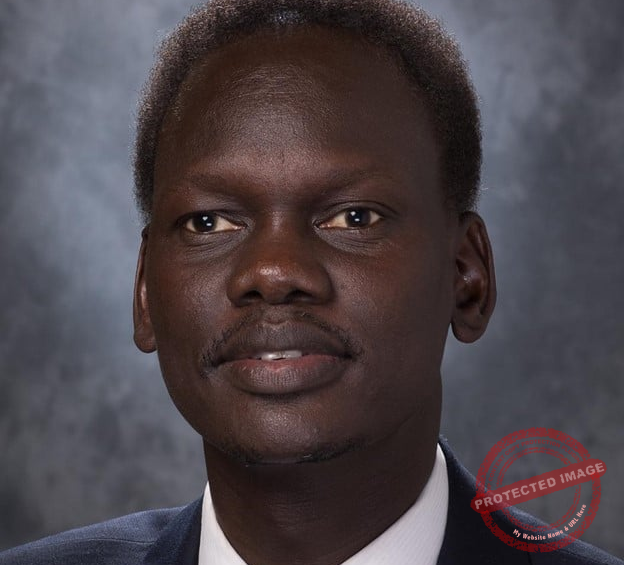
Deng Majok Chol, a researcher on the Nile water resources, climate change, environmental risks, socio-economic, and regional climate model - Courtesy
An environmental risk expert has recommended to the government to build the Fula Dam on the Bahr el Jebel and an artificial Lake at the Upper Nile -Jonglei triangle to control the floods.
Deng Majok Chol made the remark in Juba during the ongoing public consultation forum on water resources on Wednesday.
According to experts, Dams protect against flooding by collecting and holding water when they reach a certain level.
Once collected, a dam might be designed to release the water back into the river at a controlled speed or divert the water elsewhere for other uses.
The South Sudanese born-U.S citizen stated that the construction of the Fula Dam is the best option to mitigate floods.
However, Chol said that feasibility studies will have to be carried out before constructing the dam and an artificial lake along the Upper Nile-Jonglei triangle.
“The recommendation that I have been saying many times, South Sudan needs to run up the Fula Dam. They need to dig it big, wide, and deep, this is where you can dig a real dam because you have the waterfall, we have the water velocity,” Chol said.
“In a long-term study, my clean recommendation it’s the construction of an artificial lake in the triangle area of Upper Nile and Jonglei,
“The artificial lake is recommended here as a study that needs to be studied. We need to study the depression, the water catchment, the runoff, and also where the capacity of such a lake in respect of the area is not inhabited,
“This will not have any problem with any country as its meant to capture the rain and the runoff from Boma mountains, and local rain.”
But in the meantime, Majok Chol suggested the relocation of the flood-affected populations to dry grounds.
Another temporary solution Mr. Chol recommended, is the need to invest in building dykes in the flood-affected areas.
“In the case of Upper Nile, Jonglei, and Unity state, there is no shortcut, let’s have an investment in a relocation program for the affected population, at the state level, and national levels,” Chol said.
“The national level needs to come up with a budget to support this relocation program for the time being,
“The other recommendation is that we also need to continue the construction of dykes, higher and safer dykes around towns, especially in areas or counties that are submerged,
“We also need to design the construction of minor canalizations,
“In the medium-term studies, I also continue to recommend investment in the affected population’s relocation program,
“Let’s not forget to invest in the community that is hosting, because sometimes if that is not managed well, it creates a new problem, a problem of social existence.”
Deng Majok Chol is among the team of environmental experts who arrived in the country on Friday last week to conduct five days of public consultation on the White Nile water.
The team of water experts gave a scientific analysis for the government to have an informed decision on how to manage the Nile water without affecting the delicate ecosystem in the Sudd region.
Support Eye Radio, the first independent radio broadcaster of news, information & entertainment in South Sudan.
Make a monthly or a one off contribution.
Copyright 2024. All rights reserved. Eye Radio is a product of Eye Media Limited.